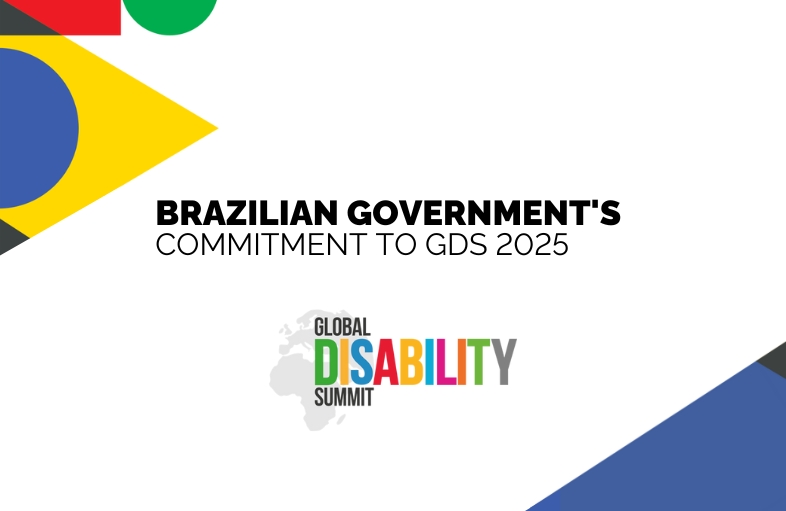Brazil is presenting the National Plan for the Rights of Persons with Disabilities – Novo Viver sem Limite or New Living Without Limits at the Global Disability Summit 2025, on April 2 and 3 in Germany. The plan, which encompasses a series of initiatives, is one of the commitments made by the federal government to ensure greater dignity for persons with disabilities, their families, and communities throughout the national territory. It proposes integrated actions in various areas, including governance and social participation, combating ableism, accessibility, and the promotion of economic, social, cultural, and environmental rights.
According to Anna Paula Feminella, National Secretary for the Rights of Persons with Disabilities—who will represent Brazil at the GDS 2025—the national plan reflects the country’s commitment to establishing a permanent policy focused on persons with disabilities, responding to a historic demand from social movements and society as a whole.
“The New Living Without Limits Plan aligns with the GDS ambition to leave no one behind, by systematically integrating disability inclusion into Brazil’s development cooperation and humanitarian action efforts,” she highlighted.
Coordinated by the Ministry of Human Rights and Citizenship (MDHC), the plan includes 95 actions and investments totaling BRL 6.5 billion (approx. USD 1.3 billion), distributed across the following areas:
- Governance and Social Participation – BRL 76.2 million
- Combating Ableism and Violence – BRL 177.8 million
- Accessibility and Assistive Technology – BRL 2.23 billion
- Promotion of Rights – BRL 4.03 billion
To date, the plan has resulted in the delivery of 3,000 accessible school buses for the safe transportation of children with disabilities, and a 35% increase in funding for Specialized Rehabilitation Centers (CERs), which provide physical, visual, hearing, and intellectual rehabilitation services in all regions of Brazil.
In addition, the Brazilian government has made 250,000 training slots available in inclusive education courses for teachers, launched multi-sensory rooms for neurodivergent individuals in airports, and created 28 Assistive Technology Laboratories to foster scientific, innovative, and entrepreneurial advancement in the country’s tech sector. These labs are multi-user facilities open to both public and private actors and focus on research that promotes personal autonomy, labor market inclusion, and social participation of persons with disabilities, people with reduced mobility, and older persons.
Governance and Social Participation
During the plan’s launch, President Luiz Inácio Lula da Silva emphasized that the public policy mobilizes Brazil, civil society, states, and municipalities—from large capitals to rural and riverside communities—with the goal of ensuring inclusion and dignity for all.
“To live without limits is to live fully. It is for every human being to be able to do everything they have the potential to achieve. The New Living Without Limits Plan symbolizes and strengthens these commitments, expanding them through broader actions born from deep dialogue with society. We want a Brazil where we can proudly say: limited is not the person with a disability—but the one who refuses to see, to listen, and to care,” concluded President Lula.
The New Living Without Limits Plan was created with the aim of breaking away from assistentialist paradigms and strengthening autonomy, empowerment, and the recognition of persons with disabilities as rights-holders. In this context, Minister Macaé Evaristo emphasized that the plan is essential to guaranteeing full citizenship to persons with disabilities: “We cannot be a democratic republic while some sectors and people in our society are excluded from the right to exist. Our task is Ubuntu—which in African philosophy means humanity for all,” she stressed.
Commitment and Adherence
So far, seven Brazilian states have officially joined the plan: Piauí, Maranhão, Bahia, Paraíba, Ceará, Alagoas, and Pernambuco. Other states, such as Mato Grosso do Sul, are in advanced stages of adherence. The national plan includes 95 actions, of which 17 have been completed and 18 have reached partial delivery. The government aims to secure national adherence to the program, ensuring that all federative units are committed to implementing these transformative policies.
A Global Event
The third edition of the Global Disability Summit (GDS), in which Brazil will participate, is organized by the International Disability Alliance (IDA), the Government of Germany, and the Government of Jordan. The summit aims to bring together global, regional, and national stakeholders to promote the inclusion of persons with disabilities and the global implementation of the UN Convention on the Rights of Persons with Disabilities (CRPD).
Regarding Brazil’s participation in this major international event, Anna Paula Feminella highlighted the country’s active role in global discussions: “Brazil has shown leadership in this area. In December of last year, we hosted the Latin America and Caribbean Regional Disability Summit. The event was a landmark in the articulation of inclusive policies and reaffirmed our commitment to the global disability rights agenda. We are now presenting our experiences and progress, emphasizing the importance of international cooperation in building more socially just communities,” she concluded.
Texto: T.A.

